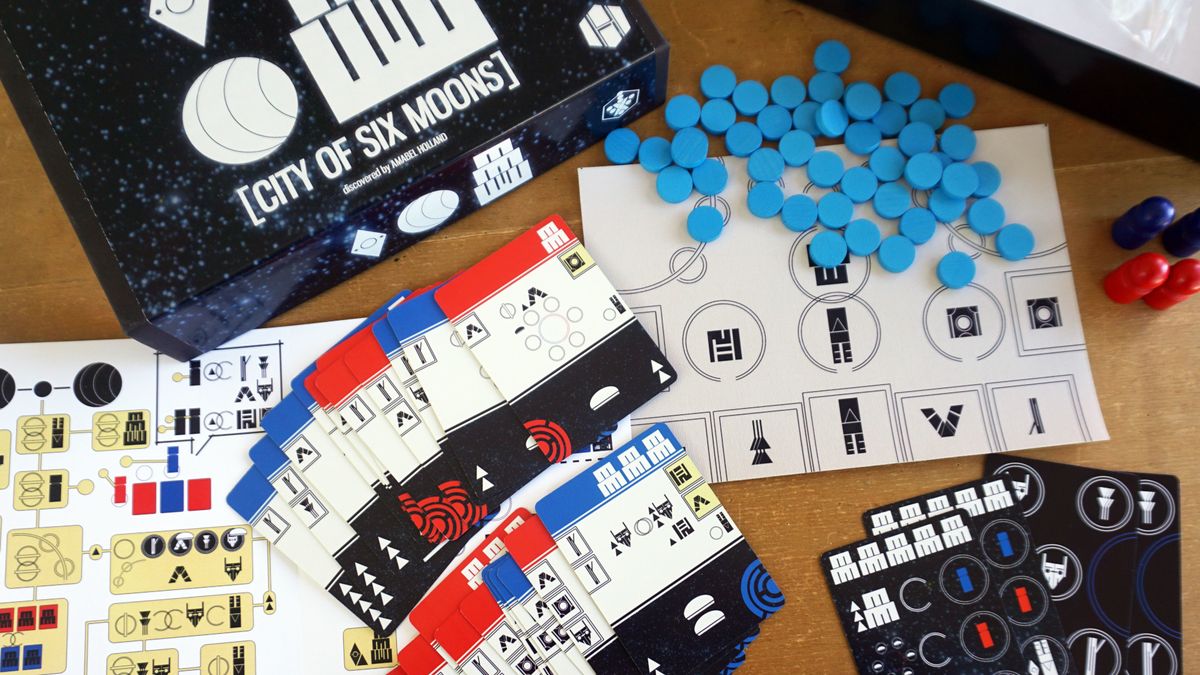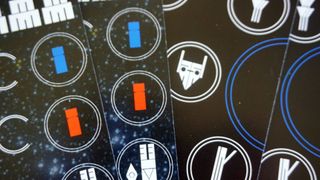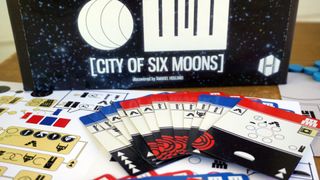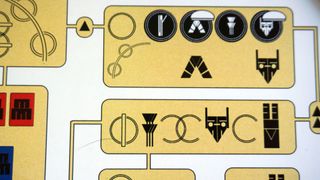"People have spent 20 hours solving" City of Six Moons, the board game you must learn an alien language to play
Interview | Designer Amabel Holland on the joy of watching players solve her “very strange idea”

For many people, learning the rules of any unfamiliar board game can feel as alien as learning a brand new language. Yet few games make that experience quite as literal as City of Six Moons. Its rulebook arrives written in a mysterious series of symbols that players must translate before they can play the game itself – and may never know if they’ve got everything right.
Designer Amabel Holland originally designed the cryptic puzzle-game as a more conventional single-player experience about building up city-states in Mesopotamia. While that board game was designed back in 2018, Holland recalls she found “it was missing an indefinable something” at the time, putting the idea on the shelf and periodically revisiting it each year until inspiration struck to include the idea of translating an alien language in 2023 – a concept not often seen in the best board games.
“Part of the problem is that around the time I was finishing work on the original game, I was getting more ambitious,” Holland says. Her previous games include This Guilty Land, which casts the players as representations of Justice and Oppression in a battle over slavery in a pre-Civil War United States, and Table Battles, a simplified wargame system that can simulate different conflicts across centuries of history. “Much of my work in board games is pretty overtly experimental and political. The political games centre around observing and understanding models of systems.
“Board games actually have an advantage over video games here because they can’t hide anything – it’s all made concrete and transparent. In order to operate the model, in order to play the game, you’ll need to understand the whole picture – which makes them a great tool for helping someone understand real-world systems. In this sense, the process of learning the game is a key source of meaning.”
An unsolvable puzzle

As City of Six Moons evolved beyond being 'just' a game, Holland drew inspiration from another puzzle that requires the player to work out its rules and language in tandem, Blaž Urban Gracar’s word-search book LOK, and her own experience attempting to figure out the rules for a German edition of hide-and-seek classic Mister X she had bought in a thrift shop.
“I had to work out how it played based on the icons, based on commonalities between German and English, and based on my own knowledge of how games tend to function,” Holland says. “It was a very enjoyable experience, and I wondered if I might not build that experience deliberately into this game.”

Amabel is the co-founder of and a designer for Hollandspiele, a "small weird publisher that specializes in small weird games." She is perhaps best known for Irish Gauge, Northern Pacific, Table Battles, and Agricola, Master of Britain. You can find her on Twitter/X @AmabelHolland.
The designer refuses to answer any questions about City of Six Moons’ language or rules, leaving the game in the hands of players to decode and play – even if that means they might never get all the details quite right. (I won’t spoil anything here.) Even so, Holland has carefully designed the symbol-based language to help ease players into the unusual process of translating its rulebook while logically learning how to play along the way. (Beginner tip: start with the first page, which is deliberately easier to decode.)
Sign up to the 12DOVE Newsletter
Weekly digests, tales from the communities you love, and more
“This was the major challenge with the game, and it necessitated me rewriting the rulebook from scratch several times,” Holland says. “In order to remain within the conceit, the systems needed to all fold into each other – not a series of discrete puzzles but one big puzzle with solutions dependent upon each other. And the problem with something like this is it’s not a puzzle you can solve, in the sense that 'solving' something involves following a series of concrete steps laid out for you by the puzzle’s designer to arrive at a confirmable solution.”
Keeping the language focused on its purpose as a way of learning and understanding the game means that its icons – lightly influenced by ancient cuneiform writing – can’t be used to translate entire English sentences in the same way as, say, Klingon. It is a language that exists to communicate ideas about the game, in the game.
“It was important to me that this not be a 'language' or a substitution cipher, but a depiction of systemic relationships and concepts via icons – an iconographic language,” Holland explains. “There aren’t really 'sentences' in a traditional sense, so I don’t think one could necessarily use it for narrative purposes.”
A fundamentally different experience

Both the language and the game itself are presented as artefacts of an alien civilisation, with Holland imagining the kind of cultural differences between humanity and extraterrestrial beings that might have shaped their unique gaming habits – some of which also speak directly to what Holland sees as Earthly problems in the civilisation-building and tableau-building genres of board games.
“I didn’t write a wiki for it or anything like that,” she replies when asked how deep the lore of her alien species runs. “When the game approached its final form, these ideas informed what I felt to be the cultural assumptions these visitors would be working from.”
While translating City of Six Moons is more than a prelude to playing the game – it’s an integral part of the complete experience – Holland assures that the fully-decoded rules create a game varied enough to be played again and again, even when part of the puzzle is solved.
“It’s going to be a fundamentally different experience once you’ve figured it out, and perhaps a lesser one, but that doesn’t bother me very much,” she says.
Still, even getting to that point might take players as long as they would spend playing other games night after night.
“It occurred to me after playtesting that the puzzle was going to be really quite easy to solve, so I wondered if I might not do another one that was harder,” Holland says, considering the potential of another game ‘created’ by the same alien civilisation. “But I’ve heard from people putting 20-plus hours into the solution aspect, and still having questions, so apparently it’s much harder than me or my testers thought!”

With City of Six Moons now in players’ hands, Holland expresses joy at watching other people find their way through its puzzle in different ways. Discussions on BoardGameGeek share potential solutions, messages coded in the same alien language and even in-universe theories about who wrote the game’s rulebook. With players already far down the rabbit hole, its real-life creator teases that the game may hold even more surprises than players expect, too
“I’ve seen some of the translations and the assumptions people make are fascinating, both in terms of cultural assumptions and in terms of mechanical blind spots,” she says. “I feel extraordinarily privileged because I get to engage with this game in a way no-one else quite can – I get to observe how others engage with it, how they approach the puzzle. And I know things about the game and its production no-one else does. Because, for example, not everyone has exactly the same components, or exactly the same rulebook.”
With City of Six Moons clearly hooking players with its unique mixture of language puzzle, game design commentary and an actual, playable board game, Holland is delighted that her ambitious vision hasn’t been seen as quite so alien itself.
“I’m really blown away by the success of this game, and the reception to what is on its face a very strange idea,” she says. “This life is full of happy surprises.”
For more recommendations of what to play next, check out our guides to must-have board games for adults and the best card games.

I have been writing about tabletop gaming, video games and pop-culture of all kinds for over a decade. As well as writing for 12DOVE, I’ve been an editor and journalist for outlets from Dicebreaker, Eurogamer and Rock Paper Shotgun to Kotaku, Tabletop Gaming and MCV, as well as appearing across BBC radio and television, The Washington Post, NPR, and more as an industry expert. I’ve also contributed to a book celebrating Metal Gear Solid and even been the voice of an advert for a local caravan seller. When I’m not playing board games, tabletop RPGs and trading card games, you’ll probably find me watching anime, listening to K-pop or obsessing about cats. Follow me everywhere @liquidmatt.
Most Popular



